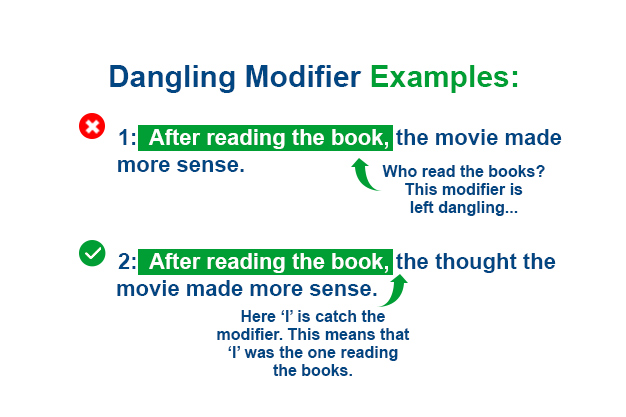Have you ever come across sentences that have left you confused about who did what? This might be due to a grammar error called a dangling modifier. These are misplaced phrases or clauses that create confusion by modifying the wrong word or phrase. It
For instance, you may come across a sentence such as, “running through the park, the ice cream cone melted.” Reading this sentence, one may get the impression that the ice cream cone is melting while running, which is an absurd thing. This is a classic example of a dangling modifier.
Dangling modifiers can trip up readers and make your writing unclear. This is why it is important to have a thorough understanding of dangling modifiers. It will enable you to identify and eliminate them easily. So read on!
What is a Dangling Modifier?
A dangling modifier is a grammatical error that occurs when a modifier, usually an adverbial phrase, is placed in a sentence without a clear connection to the subject it is intended to modify. This results in a sentence that is confusing and incomplete in meaning.
Sometimes, it can even change the meaning of the sentence. Dangling modifiers are common grammar mistakes made by writers and can be easily overlooked. But they can greatly affect the clarity and effectiveness of a piece of writing.

To better understand what a dangling modifier is, let’s break down the term. A modifier is a word or phrase that provides additional information about a noun or pronoun. It can be an adjective, adverb, or phrase.
For example, in the sentence, “The tall tree swayed in the wind,” the word “tall” is a modifier that describes the noun “tree.” A dangling modifier, on the other hand, is a modifier that is not placed next to the word it is supposed to modify, thus creating confusion and ambiguity in the sentence.
How To Identify a Dangling Modifier?
Identifying a dangling modifier can be tricky, but there are certain clues that can help you spot it. One of the most common signs of a dangling modifier is when the subject of the sentence does not match the modifier.
For example, “Walking home from work, the rain started to pour.” In this sentence, the modifier “walking home from work” does not have a clear subject that it modifies. Is it the person who is walking or the rain that is pouring? The lack of clarity makes this a dangling modifier.
Another clue is when the modifier is placed at the beginning of a sentence, separated from the subject by a comma. For example, “After finishing the book, the movie was released.”
In this sentence, the modifier “after finishing the book” seems to modify the subject “the movie,” which is incorrect. A film cannot finish a book; it is the person who finishes the book.
These are just a few examples, but there are many other ways a dangling modifier can sneak into a sentence.
How To Eliminate Dangling Modifiers?
To fix a dangling modifier, you need to make sure that the modifier is placed next to the word it is supposed to modify. This means that you need to identify the subject of the sentence and place the modifier right after it.

Going back to our previous examples, “Walking home from work, I got caught in the rain.” Here, we have specified the subject “I” and placed the modifier “walking home from work” right after it, making it clear who is walking and who got caught in the rain.
Similarly, “After finishing the book, the author released the movie.” Here, we have identified the subject “the author” and placed the modifier “after finishing the book” right after it, making it clear that the author is the one who finished the book and released the movie.
Dangling Modifier: Examples
Now that we understand what a dangling modifier is and how to fix it let’s look at some common examples to better understand this grammatical error.
1. “Running through the park, my dog chased a squirrel.”
In this sentence, the modifier “running through the park” is misplaced. It seems to modify the subject “my dog,” but technically, the dog cannot be running and chasing at the same time. The correct way to phrase this sentence would be, “While I was running through the park, my dog chased a squirrel.”
2. “Feeling tired and hungry, the sandwich was a welcome sight.”
The modifier “feeling tired and hungry” does not have a clear subject to modify. Instead, it seems to modify the sandwich, which is incorrect. The correct way to phrase this sentence would be, “Feeling tired and hungry, I was relieved to see the sandwich.”
3. “Hiking through the mountains, the scenery was breathtaking.”
In this sentence, the modifier “hiking through the mountains” is misplaced. It seems to modify the scenery, but technically, the scenery cannot be hiking. The correct way to phrase this sentence would be, “Hiking through the mountains, I was amazed by the breathtaking scenery.”
4. “Having finished my dinner, the waiter brought the check.”
Here, the modifier “having finished my dinner” is placed at the beginning of the sentence, making it seem like it modifies the waiter. The correct way to phrase this sentence would be, “After I finished my dinner, the waiter brought the check.”
5. “With her hair tied in a ponytail, the teacher scolded the student.”
The modifier “with her hair tied in a ponytail” is misplaced and makes it seem like the teacher’s hair is scolding the student. The correct way to phrase this sentence would be, “With her hair tied in a ponytail, the teacher scolded the student.”
Dangling Modifiers in Long Sentences
Now that we have seen some examples of dangling modifiers, it is important to note that they can also occur in longer sentences and even in different forms.
1. “While reading the book, the movie was announced to be in production.”
In this sentence, the modifier “while reading the book” seems to modify the subject “the movie.” However, it is the person reading the book and not the movie that is doing the action. The correct way to phrase this sentence would be, “While I was reading the book, I found out that the movie was in production.”
2. “Driving to work, the car broke down.”
The modifier “driving to work” seems to modify the subject “the car,” but technically, the car cannot be driving itself. The correct way to phrase this sentence would be, “While I was driving to work, my car broke down.”
3. “Without a jacket, the cold wind chilled her to the bone.”
In this sentence, the modifier “without a jacket” is misplaced and makes it seem like the cold wind is without a jacket. The correct way to phrase this sentence would be, “Without a jacket, she was chilled to the bone by the cold wind.”
Dangling Modifiers in Phrases

Dangling modifiers can also occur with phrases rather than single words.
1. “While rushing to the airport, the luggage was left behind.”
The modifier “while rushing to the airport” does not have a clear subject to modify. The correct way to phrase this sentence would be, “While rushing to the airport, I left my luggage behind.”
2. “During the wedding ceremony, the ring was slipped onto her finger.”
The modifier “during the wedding ceremony” seems to modify the subject “the ring. ” but technically, it is the person who is doing the action. The correct way to phrase this sentence would be, “During the wedding ceremony, the groom slipped the ring onto her finger.”
Dangling Modifiers in Clauses

In addition to phrases, dangling modifiers can also occur with clauses.
1. “If not completed by tomorrow, I will lose my job.”
In this sentence, the modifier “if not completed by tomorrow” seems to modify the subject “I,” but technically, it is the action that is not being completed. The correct way to phrase this sentence would be, “If I do not complete it by tomorrow, I will lose my job.”
2. “Because of the heavy rain, the game was canceled.”
The modifier “because of the heavy rain” is misplaced and makes it seem like the game is causing the rain. The correct way to phrase this sentence would be, “Due to the heavy rain, the game was canceled.”
Final Thoughts
To sum up, dangling modifiers are common grammatical errors that can greatly affect the clarity and effectiveness of a sentence. To avoid them, it is important to always make sure that the modifier is placed next to the word it is supposed to modify.
Spotting and correcting dangling modifiers takes practice, but once you understand the concept and familiarize yourself with common examples, it becomes easier to identify and fix them in your writing.
As a writer, it is crucial to pay attention to the placement of modifiers and ensure they are modifying the correct subject to convey your message accurately and effectively.
YOU MAY LIKE THIS:
- Enhance Your Spoken Language Skills With “Daily Use Of English Sentences”
- What Are The Types Of Sentences In English Language With Examples
- What Is A Compound Sentence in English Grammar: Let’s Find Out
